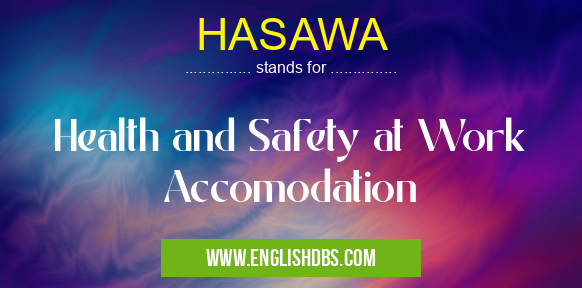What does HASAWA mean in HEALTHCARE
HASAWA stands for Health and Safety at Work Act 1974 and it is a crucial part of workplace safety legislation in the UK, regulating how employers must protect their employees’ physical and mental wellbeing. The HASAWA plays an important role in helping to make sure that workplaces are safe and free from hazards so that everyone can work without fear of injury or illness. HASAWA ensures that employers have responsible policies and procedures in place so that workers feel confident enough to report any potential dangers they encounter.

HASAWA meaning in Healthcare in Medical
HASAWA mostly used in an acronym Healthcare in Category Medical that means Health and Safety at Work Accomodation
Shorthand: HASAWA,
Full Form: Health and Safety at Work Accomodation
For more information of "Health and Safety at Work Accomodation", see the section below.
» Medical » Healthcare
Benefits of HASAWA
The Health and Safety at Work Act 1974 gives both employers and employees certain rights when it comes to protecting themselves from potential dangers at work. For employers this includes having legally binding responsibilities for assessing risks associated with tasks being carried out by staff as well as ensuring that all health and safety regulations are met. Furthermore they must provide staff with protection against physical or mental harm caused by their working environment. On the other hand employees benefit from knowing that there is support available should anything happen to them while on the job; this can range from compensation claims if they become injured due to negligence on behalf of their employer to training courses which help them understand their rights under health and safety legislation like HASAWA.
Essential Questions and Answers on Health and Safety at Work Accomodation in "MEDICAL»HEALTHCARE"
What is HASAWA?
Health and Safety at Work Act (HASAWA) is a 1974 law in the UK which sets out the general duties employers, employees and self-employed people owe to each other to ensure their health, safety and welfare at work.
What does HASAWA cover?
HASAWA covers a wide range of workplace health and safety regulations such as requirements for safe workplaces, equipment, and procedures for protecting workers from risks associated with their work.
What are the main benefits of HASAWA?
HASAWA aims to prevent injuries and illnesses caused by unsafe or unhealthy working conditions. It also helps employers meet their legal responsibility for the health and safety of their employees. The Act also ensures that employers provide suitable protective clothing, first aid equipment, fire safety training, information about risks at work etc.
Do I need to be aware of all the legislation under HASAWA?
Employers should be familiar with all relevant legislation under HASAWA so they can take appropriate measures to protect their workers. This includes ensuring that premises are structurally sound and properly lit, providing necessary protective clothing etc. It is important to follow best practice wherever possible in order to ensure compliance with the law.
What happens if I don't follow HASAWA guidelines?
Failure to comply with HASAWA guidelines can have serious consequences including large financial penalties or even imprisonment for serious breaches of health & safety rules. If an employee suffers an injury or illness due to inadequate health & safety measures then this could lead to civil action being taken against the employer.
How do I know what my obligations are under HASAWA?
Every employer must assess potential risks in the workplace regularly and develop specific policies for eliminating hazards or where these cannot be eliminated adequately control exposure levels through engineering controls, administrative procedures or personal protective equipment (PPE). You should familiarise yourself with different parts of the Act applicable to your particular industry and situation in order to ensure that you are meeting your obligations.
Can I use tools/equipment that haven't been tested/approved under HASAWA?
No – it is mandatory that all tools/equipment used in a workplace must have been tested/approved according to current regulations before use commences as per Section 6 of The Health and Safety at Work etc Act 1974. It is not acceptable for any employee or employer to take shortcuts when it comes to occupational health & safety concerns – it could result in serious harm or even death.
Are there different standards depending on industry sector?
Yes – while there are some common elements across all sectors there will be additional specific requirements depending on which industry sector you work in; for example construction has its own Confined Spaces Regulations 1997 which apply only within construction sites regardless of location. Employers should acquaint themselves thoroughly with relevant industry specific laws relating to occupational health &safety.
Final Words:
In conclusion, HASAWA is a very important piece of legislation which not only protects workers' rights but helps employers fulfil their legal duties too. The act provides both parties with peace of mind as employers can rest easy knowing they have taken all reasonable steps towards creating a safe working environment while employees know that if their health or safety is compromised then they have recourses through which they can take action against negligent behaviour. It goes without saying that following HASAWA helps prevent costly accidents or illnesses due to unsafe practices which could otherwise be avoided entirely - so always make sure you're up-to-date with the latest guidelines!
